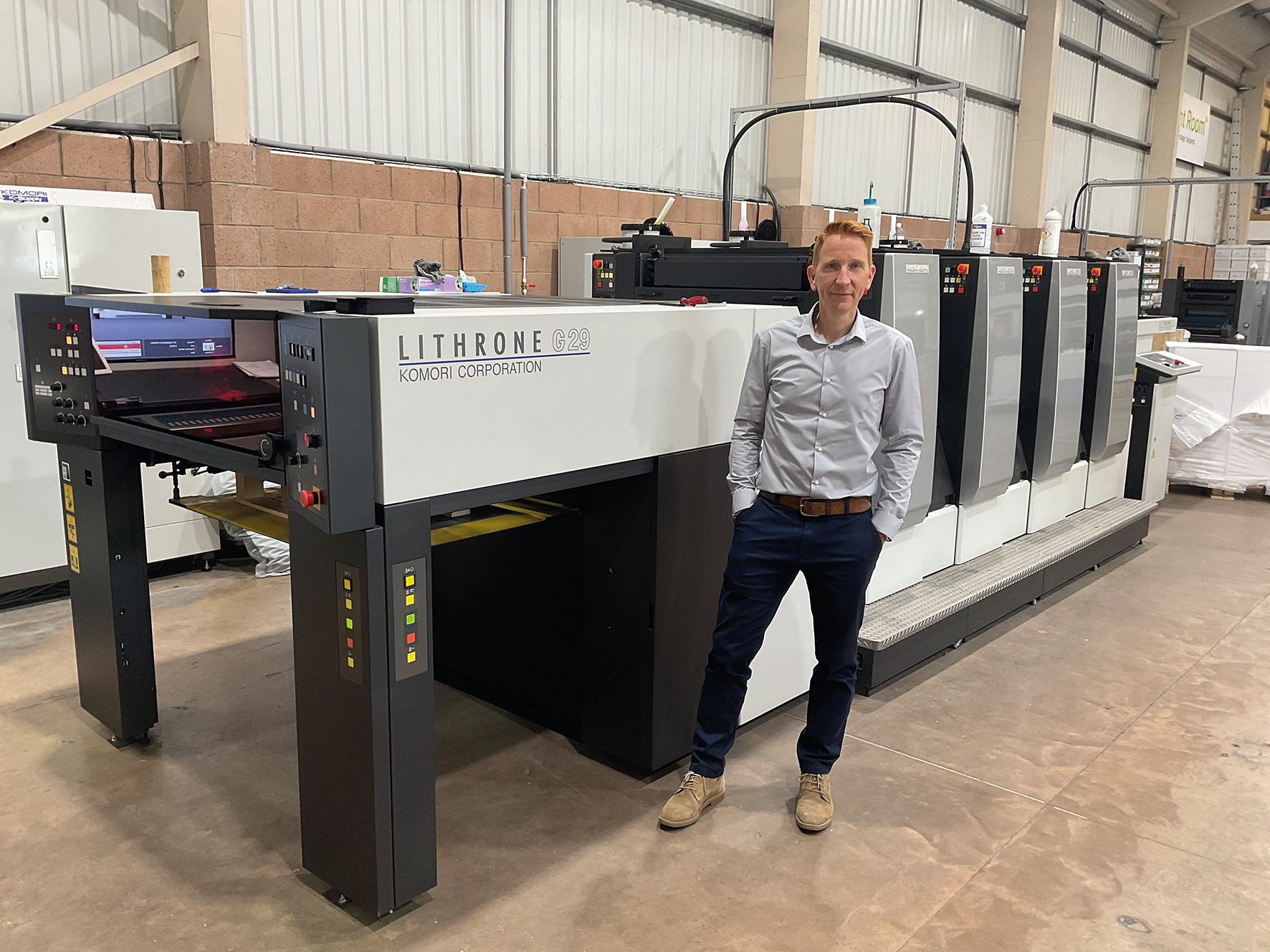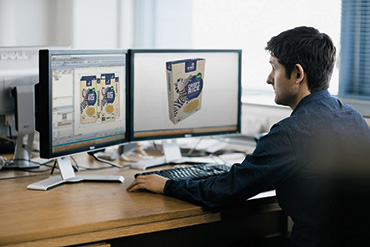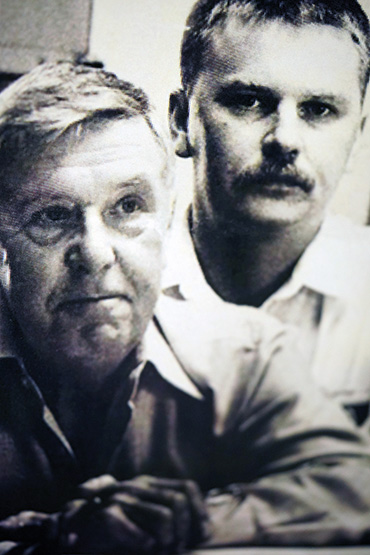Arden Software produces the Impact range of 3D CAD/CAM design and production software, aimed at manufacturers and service producers in the packaging and graphics sectors. Users range from designers, display (POS), convertors, die- makers and brands.
The software division was set up more than 30 years ago as a natural extension of its parent company, Arden Dies which 10 years earlier had pioneered the use of laser die-cutting in the UK.
This company was established in 1964 by brothers Frank and Philip Poynter, along with their friend George Snowball. They had originally set up shop as a die-makers, working out of the cellar at the Poynter family home in Bredbury, an area of Stockport. Philip and George would clock off from a day’s work making dies at a local printing firm and head straight for the cellar where they’d continue their craft. Salesman Frank would sell the dies and secure the orders.
Within four months, by February 1965, they’d outgrown their 3sqm underground workspace and moved into their first site in Marple. Arden Dies was born. Nearby Stockport and Manchester had plenty of packaging printers that needed cutting and creasing dies.
The company name was borrowed from one of the four families of landed gentry that dominated the Stockport area in previous centuries – the Ardens had owned most of Bredbury where the Poynters lived. Frank’s son Martin Poynter joined the ranks in 1978, and with a background in mechanical engineering and a passion for new technology and innovation, he continued to drive the company forward. Today he is the Arden Group managing director.
Always keen on implementing innovation, Arden Dies was one of the first to adopt the emerging laser cutting technology in the late 1970s, gradually taking over from the old way of drawing designs onto plywood and hand-cutting slots for the dies.
During an interview with Cutter and Creaser magazine in 1975, Frank Poynter was quoted as saying: “Old-fashioned dyed-in-the-wool attitudes towards die-making have got to go. Laser-cut dies are definitely here to stay. I’ve had a hard time convincing my customers, but once they’ve seen the results they won’t have anything else.”
Arden installed the UK’s first Lasercomb unit. A few years later this story’s writer, Simon Eccles, was working as an estimator for a local boxmaker, Lithopak, regularly ordering both conventional and laser cut dies from Arden Dies.
During the 1980s, Arden continued to expand and a partnership with German packaging company Marbach was formed (Marbach is now a co-owner). This let Arden Dies further invest in technology and in 1985, it moved into a purpose-built factory unit in Marple. It’s still there today, though the site was renovated and further expanded in 2005.
As Arden expanded its use of CNC technology, Martin Poynter spotted a gap in the market for specialist packaging software for die-makers and enlisted a couple of colleagues to begin producing their own CAD/CAM software. Before long this bespoke software, originally called IPD (Interactive Packaging Design) was being noticed across the sector and in 1988 Arden Software was set up to sell it.
Software range
The original name was kept until 1998, when it was renamed Impact. It has always been the flagship product in Arden Software’s line-up and is sold worldwide. Key features for designers include the library of templates covering corrugated and folding carton shapes; the interactive drawing toolset; file exchange to support CAD and non-CAD drawings; layout and nesting arrangement for printing and cutting arrangements; and the ability to generate virtual 3D samples and animated prototypes that can be shared with customers.
For die-makers on the production side it includes a library of pre-loaded machine parameters; libraries of customer-specific machines; error and clash detection tools for die board and stripping units; configurable output machine drivers with support for flatbed and rotary tools as well as file format support.
Impact can also be used alongside packaging solutions from Esko, Hybrid and Kodak. There’s a bi-directional plug-in for Adobe Illustrator to help with artwork creation.
Impact nServer, introduced in 2003, is a CAD automation engine that can be used in isolation or integrated into other business systems to automate CAD-related tasks or data exchange. “It provides genuine automation of CAD processes within packaging,” says Arden Software business director Matt Hewitt. “From PDF to pallet, everything can be automated with nServer.”


Arden supplies design and manufacturing applications globally
The WEBcnx platform launched in 2006 can integrate with Impact and other business systems to act as a virtual project manager to automate workflows. There are customer portals that allow approvals and the like.
Enterprise, launched in 2010, is a secure centralised database for work-in-progress, accessible by anyone who needs it worldwide. It allows for distributed and collaborative working and also quick access to existing designs for re-use.
Impact is a desktop application, but utilises a back-end database, which is increasingly being deployed to the cloud. “We’re also starting to see Impact utilised in combination with Desktop as a Service (DaaS) technology, as a result of the demand for remote working solutions,” says Hewitt. “WEBcnx, nServer and Enterprise are more commonly deployed in the cloud, with nServer offered as a SaaS solution typically used to power web-to-pack solutions.”
The company is also the global reseller for Dotscan, a precision inspection system for Braille on packaging, to verify that it meets European standards.
Arden Software has roughly 5,000 customers in over 90 countries worldwide, with 20,000 licences across the CAD products, which Hewitt says are increasing year-on-year. Major names include International Paper, Packaging Corporation of America, Stora Enso, Mondi Group (Europe), Marbach, Lego, Sony, HP, Microsoft, Nissan and Honda.
“Around a third of our CAD licences are with die-makers, making us the largest supplier in this sector,” says Hewitt. “The rest are designers, display (point-of-sale), convertors, die-makers and brands. With WEBcnx there are hundreds of thousands of users, growing rapidly, as these are not just our customers, but our customers’ own customers.”
Further expansion
The original Arden Dies business has continued as a trade service, modernising its facilities as needed. In 2020 it was the first UK company to be accredited in Bobst’s Die-making Certification Programme.
In 1999 the group launched Arden Engraving to create embossing and hot foil dies. Cutting and creasing and hot foiling are often done in conjunction, so this was a logical move. CNC technology is used, with crossover knowledge from the other group activities.
All UK activities are handled from the Marple factory, but Arden Group has overseas interests and partners too. Arden Engraving has a US division in Charlotte, North Carolina, as well as a German-based arm, Arden Engraving Germany, established in 2018. It also entered into a partnership with Polish engraving firm STAMP Systems in 2021.
Arden Software has had a US office in Utah since 2008, now called Arden Software North America. In 2010 it opened offices in Denmark and Germany, and in 2015 it opened Arden Software Asia Pacific (ASAP), in response to growing demand in Asia for packaging design and manufacturing software.

Frank Poynter and son Martin
In 2020, Arden Software completed the acquisition of its US-based competitor Cimex Corporation, developer of the CimPACK packaging design software. Hewitt says, “Much like Arden, Cimex is a global supplier of CAD and CAM software in the packaging sector, so we were delighted to bring their skills and expertise into the Arden Group, with the partnership bringing together some of the best minds in the industry to develop a new era of software tools and innovative solutions for our customers.”
Global operations
Today the Arden Group turns over £12m through its dies, engraving and software divisions. It employs 165 people around the world, including around 60 people in the Software division.
As for all companies, Covid lockdowns proved a challenge, but one that was overcome, says Hewitt. “For Arden Software, being a digitally focused tech company, we were able to seamlessly adapt to remote ways of working with no loss of productivity. We’ve also taken the opportunity to reflect on the way we work going forward and have naturally adapted a more remote working model that better meets the demands of our workforce and our customers in today’s modern world.
“During the height of Covid, the biggest impact we felt was the reduction in site visits and face-to-face training, which we quickly adapted to deliver remotely. However, now that the world is learning to live with Covid, we’ve been experiencing a sharp uptake in the demand for face-to-face training and site visits once again.”
What’s coming next?
With its 60th anniversary on the horizon, Arden Group is still going strong. Arden Software has plenty of projects in the works. A new release, WEBcnx 2022 is due this year and Hewitt says it will be the most significant release for three years, with more features and the fastest performance to date.
He adds “Impact 2022 is also scheduled for release imminently, however we’re most excited about Impact 2023, which will deliver the next generation in parametric design software, for quicker and easier resize and reuse.”
STAR PRODUCT
Impact is the flagship product and has many users around the world. It boasts a full suite of design tools for creating packaging and works alongside packaging solutions from Esko, Hybrid and Kodak. There’s a bi-directional plug-in for Adobe Illustrator to help with artwork production. For die-makers it includes a library of pre-loaded machine parameters; libraries of customer-specific machines; error and clash detection tools for die board and stripping units; configurable output machine drivers with support for flatbed and rotary tools as well as file format support.











